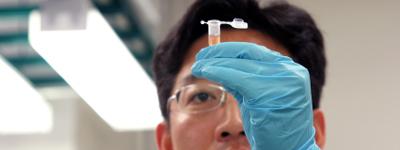Licensing
Innovative tools and technologies available for commercial development.

The quality of our research is reflected in the technologies and other intellectual property currently available for licensing or collaborative research and development.
Reagents and antibodies
Improved 'humanised' mouse models
A genetic engineering strategy in mouse embryonic stem cells to replace large regions of mouse chromosomal sequences (>100kb) with the corresponding human syntenic region.
Monoclonal antibody to streptavidin-binding protein
A monoclonal antibody to the streptavidin-binding epitope tag widely used in affinity purification of proteins.
Analysing the methylation status of human genes
Novel CGI-enrichment technology using two protein domains that isolate methylated and non-methylated CpG islands (CGIs).
Live attenuated Salmonella for vaccine development
Our method of producing safer, more effective, live attenuated Salmonella bacterial vaccines could be applied to the development of better vaccines for this and other infectious diseases.
Stem cells
Defined media for culturing regionalised anterior endoderm cells
Our defined media and serum-free process for isolating anterior definitive endoderm cells from mouse embryonic stem cells could improve the derivation of key gut-associated organ cells and provide a new set of gene profiling markers for directed differentiation.
Haematopoietic stem cell expansion
A method for producing large quantities of haematopoietic stem cells from tissues in the laboratory that could potentially be used to treat a wide variety of blood disorders and cancers.
Non-viral method for creating induced pluripotent stem cells
Our safer, non-viral plasmid vector for generating induced pluripotent stem cells by introducing the four genes required for reprogramming of somatic cells in a single fragment; the genes can be removed following reprogramming.
MBD3-deficient embryonic stem cell line
A pluripotent (murine) embryonic stem cell line, which can be maintained in the absence of any exogenous factors and stimulated to differentiate into identifiable bone, muscle, skin, fat and neuronal tissue.
Contact Us
The School's Business Development Team, based within Edinburgh Innovations, are the first point of contact for any questions related to industry interactions and collaborations.
Business Development Team - School of Biological Sciences
- Edinburgh Innovations
Contact details
- Email: SBS-BD@ei.ed.ac.uk
- Web: Edinburgh Innovations
Address
- Street
Murchison House, King's Buildings
10 Max Born Crescent- City
- Edinburgh
- Post Code
- EH9 3BF
Availability
Monday - Friday 9am-5pm

